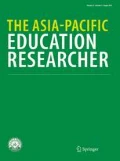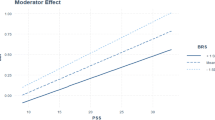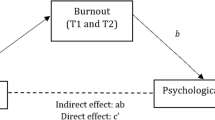Abstract
A key feature of positive education is its focus on factors that can help students flourish. In the current study, we examined the role of resilience in promoting optimal mental health of Chinese secondary school students who suffered the 2008 Wenchuan earthquake, China. In the earthquake central region, 518 participants recruited in November 2008 about 6 months and 473 participants recruited 1 year after the earthquake, were assumed to have the highest and mid-level disaster stress levels, respectively. 602 participants from areas unaffected by the earthquake in December 2008 were assumed to have the lowest stress level. Participants’ mental health and resilience were assessed by the clinical scales of the Cross-cultural (Chinese) Personality Assessment Inventory for Adolescents and the Resilience Scale for Chinese Adolescents, respectively. Higher stress level participants reported significantly lower resilience and higher mental health problems. Negative correlations between resilience and mental health problems were confirmed across the three groups. Only supportive power resilience showed significant predictions on mental health problems in the two earthquake groups. The implications on mental health counseling and positive education in Chinese secondary school students were discussed.

Similar content being viewed by others
References
Arnberg, F. K., Johannesson, K. B., & Michel, P. (2013). Prevalence and duration of PTSD in survivors 6 years after a natural disaster. Journal of Anxiety Disorders, 27, 347–352.
Bonanno, G. A., Galea, S., Bucciarelli, A., & Vlahov, D. (2007). What predicts psychological resilience after disaster? The role of demographics, resources, and life stress. Journal of Consulting and Clinical Psychology, 75, 671–682.
Cheung, F. M., Cheung, S. F., & Fan, W. (2013). From Chinese to Cross-cultural Personality Assessment Inventory: A combined emic-etic approach to the study of personality in culture. In Advances in culture and psychology (Vol. 3, pp. 117–179). New York: Oxford University Press.
Cheung, F. M., Fan, W., Cheung, S. F., & Leung, K. (2008). Standardization of the cross-cultural [Chinese] personality assessment inventory for adolescents in Hong Kong: A combined emic-etic approach to personality assessment. Acta Psychologica Sinica, 40, 839–852.
Cheung, F. M., Leung, K. & Cheung, S. F. (2005). The Cross-Cultural (Chinese) Personality Assessment Inventory-Adolescent form (CPAI-A). (Available from F. M. Cheung, Department of Psychology, The Chinese University of Hong Kong, Hong Kong SAR).
Cohen, L., Ferguson, C., Harms, C., Pooley, J. A., & Tomlinson, S. (2011). Family systems and mental health issues: A resilience approach. Journal of Social Work Practice, 25, 109–125.
Collishaw, S., Pickles, A., Messer, J., Rutter, M., Shearer, C., & Maughan, B. (2007). Resilience to adult psychopathology following childhood maltreatment: Evidence from a community sample. Child Abuse and Neglect, 31, 211–229.
Davydov, D. M., Stewart, R., Ritchie, K., & Chaudieu, I. (2010). Resilience and mental health. Clinical Psychology Review, 30, 479–495.
Fan, W., Cheung, F. M., Cheung, S. F., & Leung, K. (2008). Gender difference of personality traits among Hong Kong secondary school students and their developmental analyses. Acta Psychologica Sinica, 40, 1002–1012.
Fergus, S., & Zimmerman, M. A. (2005). Adolescent resilience: A framework for understanding healthy development in the face of risk. Annual Review of Public Health, 26, 399–419.
Frankenberg, E., Friedman, J., Gillespie, T., Ingwersen, N., Pynoos, R., Rifai, L. U., et al. (2008). Mental health in Sumatra after the tsunami. American Journal of Public Health, 98, 1671–1677.
Fu, C., Leoutsakos, J., & Underwood, C. (2014). An examination of resilience cross-culturally in child and adolescent survivors of the 2008 china earthquake using the Connor-Davidson resilience scale (CD-RISC). Journal of Affective Disorders, 155, 149–153.
Gunnar, M. R., Frenn, K., Wewerka, S. S., & Van Ryzin, M. J. (2009). Moderate versus severe early life stress: Associations with stress reactivity and regulation in 10–12-year-old children. Psychoneuroendocrinology, 34, 62–75.
Heppner, P. P., Heppner, M. J., Lee, D., Wang, Y., Park, H., & Wang, L. (2006). Development and validation of a collectivist coping styles inventory. Journal of Counseling Psychology, 53, 107–125.
Hjemdal, O., Vogel, P. A., Solem, S., Hagen, K., & Stiles, T. C. (2011). The relationship between resilience and levels of anxiety, depression, and obsessive–compulsive symptoms in adolescents. Clinical Psychology & Psychotherapy, 18, 314–321.
Hu, Y., & Gan, Y. (2008). Development and psychometric validity of the resilience scale for Chinese adolescents. Acta Psychologica Sinica, 40, 902–912.
Johannesson, K. B., Lundin, T., Fröjd, T., Hultman, C. M., & Michel, P. (2011). Tsunami-exposed tourist survivors: Signs of recovery in a 3-year perspective. Journal of Nervous and Mental Disease, 199, 162–169.
Lewitus, G. M., Cohen, H., & Schwartz, M. (2008). Reducing post-traumatic anxiety by immunization. Brain, Behavior, and Immunity, 22(7), 1108–1114.
Masten, A. S., & Narayan, A. J. (2012). Child development in the context of disaster, war, and terrorism: Pathways of risk and resilience. Annual Review of Psychology, 63, 227–257.
Ong, A. D., Bergeman, C. S., Bisconti, T. L., & Wallace, K. A. (2006). Psychological resilience, positive emotions, and successful adaptation to stress in later life. Journal of Personality and Social Psychology, 91, 730–749.
Romer, N., Ravitch, N. K., Tom, K., Merrell, K. W., & Wesley, K. L. (2011). Gender differences in positive social–emotional functioning. Psychology in the Schools, 48, 958–970.
Stewart, D. E., & Yuen, T. (2011). A systematic review of resilience in the physically ill. Psychosomatics: Journal of Consultation Liaison Psychiatry, 52, 199–209.
Tugade, M. M., & Fredrickson, B. L. (2004). Resilient individuals use positive emotions to bounce back from negative emotional experiences. Journal of Personality and Social Psychology, 86, 320–333.
Ungar, M. (2010). Families as navigators and negotiators: Facilitating culturally and contextually specific expressions of resilience. Family Process, 49, 421–435.
Wang, X., & Zhang, D. (2012). The change of junior middle school students’ life satisfaction and the prospective effect of resilience: A two year longitudinal study. Psychological Development and Education, 1, 91–98.
Weems, C. F., & Graham, R. A. (2014). Resilience and trajectories of posttraumatic stress among youth exposed to disaster. Journal of Child and Adolescent Psychopharmacology, 24, 2–8.
Yates, T., & Masten, A. (2004). Fostering the future: Resilience theory and the practice of positive psychology. In A. Linley & S. Joseph (Eds.), Positive psychology in practice (pp. 521–539). Hoboken, NJ: Wiley.
Yu, X., & Zhang, J. (2005). Resilience: The psychological mechanism for recovery and growth during stress. Advances in Psychological Science, 5, 658–665.
Author information
Authors and Affiliations
Corresponding author
Rights and permissions
About this article
Cite this article
Fan, W., Zhou, M., Cheung, F.M. et al. Contributions of Resilience to Mental Health in Chinese Secondary School Students at Different Disaster Stress Levels. Asia-Pacific Edu Res 25, 389–398 (2016). https://doi.org/10.1007/s40299-015-0266-x
Published:
Issue Date:
DOI: https://doi.org/10.1007/s40299-015-0266-x




